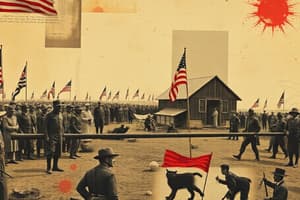Podcast
Questions and Answers
What event directly led to the start of the American Civil War in April 1861?
What event directly led to the start of the American Civil War in April 1861?
- Abraham Lincoln's election as President
- The Battle of Gettysburg
- The Emancipation Proclamation
- The attack on Fort Sumter by South Carolina (correct)
Which state was NOT among the four states that refused to support the Union and joined the Confederacy?
Which state was NOT among the four states that refused to support the Union and joined the Confederacy?
- Delaware
- Virginia (correct)
- Kentucky
- Maryland
Who gained prominence with victories in the West, including the capture of Fort Donelson in February 1862?
Who gained prominence with victories in the West, including the capture of Fort Donelson in February 1862?
- John Wilkes Booth
- Jefferson Davis
- Robert E. Lee
- Ulysses S. Grant (correct)
Which battle is considered a decisive Union victory and marked the turning point of the war?
Which battle is considered a decisive Union victory and marked the turning point of the war?
When did Lincoln issue the Emancipation Proclamation, changing the war's focus to abolishing slavery?
When did Lincoln issue the Emancipation Proclamation, changing the war's focus to abolishing slavery?
Flashcards are hidden until you start studying
Study Notes
- Between 1803 and 1854, the United States expanded its territory through purchase and conquest, tripling its size.
- New territories became a contentious issue between free and slave states.
- The North wanted new states to be free, while the South wanted them to be slave states.
- Slavery had already been a divisive issue for years, with the economy of the North industrializing and booming while the South relied heavily on slavery and farming.
- The economy of the North had more than 23 million people, while the South had around 9 million people, with 3.5 million being slaves.
- The Founding Fathers' declarations, including the Declaration of Independence and the Constitution, were used as evidence in debates about the status of new states.
- The South saw the Union as something they could leave whenever they wanted, while the North saw it as one country ruled by a central government.
- Compromises, such as the one of 1850, were made to decide the status of new territories and enforce the return of escaped slaves.
- Tensions rose as Northerners became less willing to support slavery and the Republican Party, which opposed slavery, rose to power.
- Leading up to the Civil War, politicians carried guns in Congress and fights between Representatives occurred.
- Abraham Lincoln's election as President in 1860 was the final trigger for seven slave states to secede and form the Confederacy before he took office in March 1861, leading to the start of the Civil War in April 1861.- South Carolina attacked Fort Sumter in April 1861, leading to the beginning of the American Civil War.
- Four states - Missouri, Kentucky, Maryland, and Delaware - refused to support the Union and joined the Confederacy.
- Initial Union battles were unsuccessful due to incompetent leadership and the brilliance of Confederate generals like Robert E. Lee.
- The Union implemented a naval blockade to cut off the South's supplies.
- The first major battle, the First Battle of Bull Run, occurred in July 1861 and resulted in a Confederate victory.
- Ulysses S. Grant gained prominence with victories in the West, including the capture of Fort Donelson in February 1862.
- A diplomatic crisis, the Trent Affair, nearly drew Britain into the war in November 1861.
- Lee planned to attack Washington D.C. in September 1862 but was thwarted when the Union discovered his plans at the Battle of Antietam.
- Lincoln issued the Emancipation Proclamation in January 1863, changing the war's focus from preserving the Union to abolishing slavery.
- The Battle of Gettysburg in July 1863 was a decisive Union victory and marked the turning point of the war.
- Grant was appointed General in Chief of the Union Army in 1864 and led successful attacks on Atlanta and Richmond.
- The war ended in April 1865 with the ratification of the 13th Amendment, which abolished slavery.
- President Lincoln was assassinated by John Wilkes Booth in April 1865 before he could see the amendment's ratification.
- Reconstruction and reconciliation following the war were challenging, with over 750,000 deaths making it the deadliest in American history.
- Black people gained citizenship and the right to vote, and decades of suffering came to an end.
- The consequences of the Civil War continue to impact American society today.
- Abraham Lincoln is remembered as a beloved and consequential president who preserved the nation and fought for what was right.
Studying That Suits You
Use AI to generate personalized quizzes and flashcards to suit your learning preferences.



